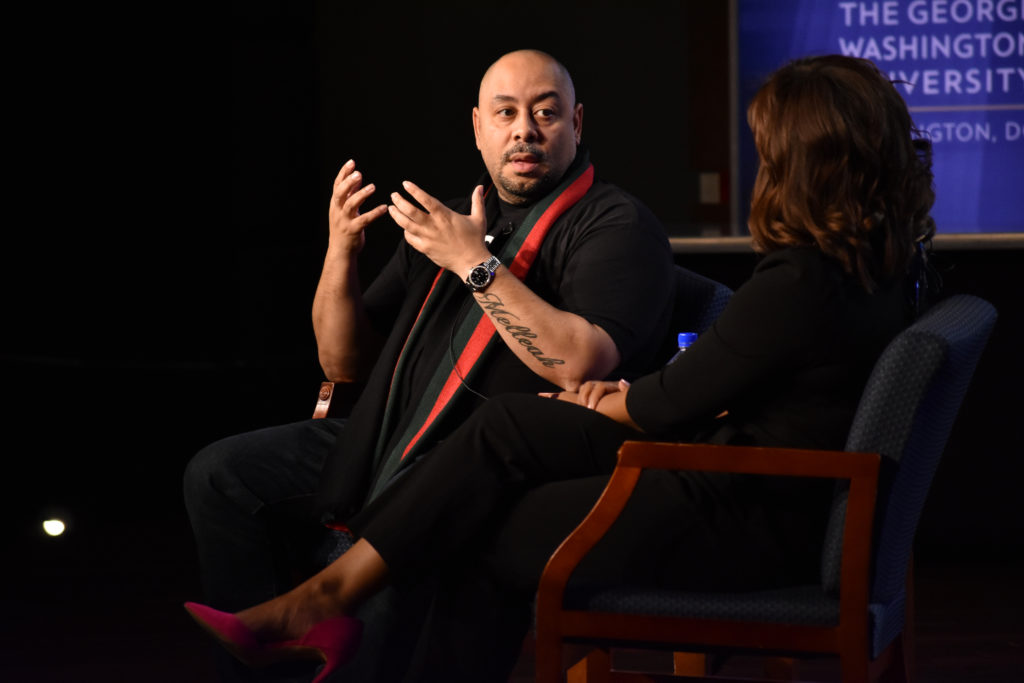One of the “Exonerated Five” – a collective term given to five youths wrongly convicted for the 1989 assault of a woman jogging in New York’s Central Park – discussed Monday how he has navigated life after his wrongful imprisonment.
Raymond Santana, an activist and founder of clothing brand Park Madison NYC, discussed his experience in the justice system with CNN legal analyst and SiriusXM host Laura Coates. About 175 people attended the chat at Jack Morton Auditorium, which followed a panel on the causes and impacts of wrongfully convicting youth of color as part of the Office of Diversity, Equity and Community Engagement’s Race in America Lecture Series.
Santana said he was “very naive” at the time of his arrest and was unfamiliar with policing tactics and terminology. He said his father was in a similar position as him and recalled watching the police pressure his father, saying they could “make this very difficult.”
“For me to watch my dad fold in a situation where this is my father, this is the person who’s supposed to save me, and he didn’t, so once I saw my dad fold, that was it,” he said.
Santana, along with four others between the ages of 14 and 16, were coerced into falsely confessing to the rape and beating of a jogger in the park. All five were convicted despite a lack of both eyewitnesses and DNA evidence, but their convictions were overturned in 2002 after a convicted serial rapist and murderer confessed to the attack.
Santana and three others served six to seven years in jail. Korey Wise, who was 16 years old at the time and the oldest of the five, was tried as an adult and served about 13 years in jail. The group filed a civil lawsuit against New York City in 2003, which city officials fought for more than a decade before settling the case for about $40 million.
He said neither he nor his father thought of asking for a lawyer during the hourslong interrogations, during which he had no sleep, food or water. Santana said he wanted “just a moment to breathe” and process what was happening or talk to his father during the investigation.
After an officer “kicked out” another aggressive officer and took over the interrogation, Santana said he thought that officer had saved his life. The officer said he didn’t want Santana to go to jail, but he needed help, so Santana gave him two written statements and a videotape, Santana recalled.
“He’s the good guy and he stopped this pressure, he stopped me from almost dying, he saved my life,” he said. “So I felt like I owed him that.”
Santana, who later served another three years on drug possession charges, said he struggled to put his life back together after incarceration. He said the “Central Park Five” label preceded him, making it difficult to meet friends or find employment, despite earning an associate’s degree while in prison.
Santana said he still deals with trauma as a result of his interrogation and incarceration, adding that there are “deep emotional scars that take forever to heal.” He said he figured out early on not to be “mad at the world,” adding that the “best revenge” has been speaking up about his situation.
“I’m going to make it so that when you get up in the morning and turn your TV on, one of us will be there,” he said.
Santana said he visits higher education institutions as a way of investing in the younger generation, who he said are the “policy- and procedure-makers of tomorrow.” He said the older generation “turned their backs” on policing and other issues within the criminal system and called for “systematic change” from young people.
“Do not be afraid – if you want that position, go get it,” Santana said. “The only thing I would ask you is that you don’t cheat, don’t cut no corners, do the job to the best of your ability and be fair because at the end of the day, we’ve got to try to make this playing field as level as possible.”





